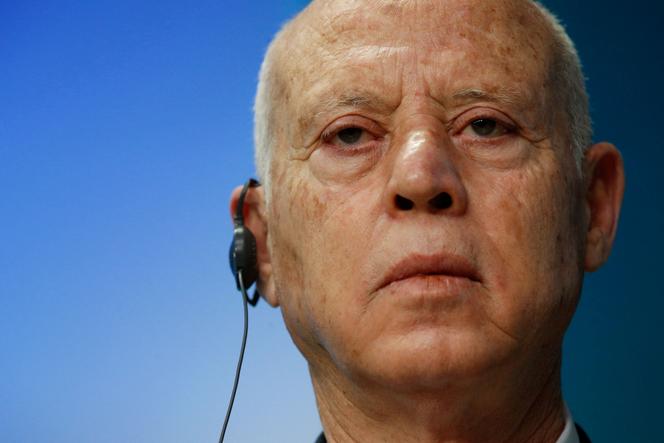
Tunisian President Kais Saied caused a stir at home and abroad when he suggested on Tuesday, February 21, that the arrival of sub-Saharan migrants was part of a plot to weaken the country's Arab Islamic identity. "There is a criminal plan to change the composition of the demographic landscape in Tunisia and some individuals have received large sums of money to give residence to sub-Saharan migrants," said the head of state, quoted in a statement from the Presidency of the Republic.
At a national security council convened on the subject, President Saied spoke of "hordes of illegal migrants" whose presence in Tunisia he called a source of "violence, crime and unacceptable acts." Insisting on "the need to quickly put an end" to this immigration, he equated it with "a desire to make Tunisia just another African country and not a member of the Arab and Islamic world," using rhetoric close to the "great replacement" theory promoted by the far right in France and in other Western countries. Indeed, Eric Zemmour, the president of the French Reconquête party, expressed his happiness that "the countries of the Maghreb themselves are beginning to sound the alarm about the migration surge" in a tweet published Wednesday morning.
"Kais Saied has finally appropriated a far-right narrative on migration that he would never have tolerated if it had been expressed in Europe on the irregular migration of Tunisians," commented anthropologist Kenza Ben Azouz, a specialist in racism in Tunisia. "By scapegoating the sub-Saharan community without fundamentally addressing the migration issue, he anchors himself in a populist and opportunistic logic."
300 arrests in one week
Tunisia has between 30,000 and 50,000 sub-Saharan migrants, according to local NGOs. A population that provides "a cheap labor force that everyone benefits from and that is tolerated by the state despite the fact that it is illegal," emphasized Ben Azouz. Many of these migrants do not stay in the Maghreb, however. Last year, half of the 22,000 migrants who arrived illegally in Europe (especially in Italy) from Tunisia were of sub-Saharan origin. These departures were motivated by the country's economic situation, the complexity of the regularization procedures, but also as of a result of mistreatment there.
On February 16, several Tunisian human rights organizations denounced the arrest of 300 migrants in a single week. "They were arrested following an identity check based on racial profiling or even due to their presence in court in support of their relatives," the statement said.
In recent weeks, racist speech and hate speech have taken on new dimensions, encouraged by the rise of the Tunisian Nationalist Party, a group that recently appeared on the internet and is calling for the deportation of sub-Saharan migrants via an online petition. The movement, which had only a few thousand subscribers on its Facebook page in early January, now has more than 50,000. And these ideas seem to be catching on.
On Tuesday, Fatma Mseddi, a recently elected member of parliament, published a photo of a black man ironically presented as "the future governor of Sfax," in reference to the eastern city where the largest migrant community is concentrated. One site also spread the fictitious figure of 1.2 million sub-Saharans present in Tunisia, without verifying or sourcing this information. The Arabic-language version of the newspaper Le Temps also devoted two front pages in February to the massive presence of these migrants in Tunisia.
'Some of them eat cats'
President Saied's words have only amplified this campaign. The publication of the presidential statement on Facebook has generated a flood of comments. Some were outraged by the head of state's remarks, while others welcomed his initiative: "Thank you for realizing what is happening, the number of crimes is appalling," wrote one person. "Mr. President, some [of the migrants] eat cats," claimed another. Faced with this wave of hatred, many internet users have also shown their solidarity with the Sub-Saharans by changing their profile pictures on social networks and denouncing the pervasive climate of racism.
"I can't believe that this kind of talk from a president is real. There is a climate of fear that is taking hold," said L., a migrant with a residence permit who has been living in Sfax for eight years. A nursery for sub-Saharan children in Tunis, which opened illegally to house the children of migrants while they work, has closed its doors. "I am too afraid that the children will be abused or that we will be attacked," its manager said.
"These comments give legitimacy to anyone who would like to attack a black person in the street," lamented Saadia Mosbah, president of the Mnemty association, which fights against racism. "Even I, as a black Tunisian, am now threatened if I go out in the street, since people don't know the difference anyway."
Fear has also spread among sub-Saharan students, who are now afraid to leave their homes. "We have received two panicked emails and a phone call," confirmed Farah Hached, vice president of the University Mahmoud-El Materi, in Tunis. "Students say they do not feel safe and beg us to find a solution." The university has requested the Ministry of Higher Education and the Ministry of the Interior "so that there is at least a reassuring speech from the authorities," she explained. For its part, the Association of African Students and Trainees in Tunisia (Aesat) issued a statement on February 17, calling on the targeted students to be "vigilant" and to travel with their residence permit "at all times."